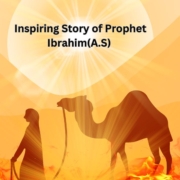Understanding Shirk in Islam: Exploring the Five Main Types
In Islam, the concept of Tawheed, or the oneness of Allah, is fundamental. Shirk in Islam, on the other hand, stands in direct opposition to this principle. Shirk refers to the act of associating partners with Allah or attributing divine qualities to anything or anyone other than Him. It is considered the gravest sin in Islam, as it goes against the very essence of monotheism. To gain a deeper understanding, let’s explore the five main types of shirk in Islam.
-
Shirk al-Asghar (Minor Shirk)
This form of shirk is subtle yet significant. It involves actions or intentions that compromise the sincerity of worship. Examples include showing off in acts of worship to gain praise or recognition from others, seeking worldly gains through religious deeds, or performing acts of worship to impress others rather than seeking the pleasure of Allah alone. While these actions may seem harmless on the surface, they diminish the purity of faith and devotion. Surah AL-Baqarah (2:165 Quran)
وَمِنَ ٱلنَّاسِ مَن يَتَّخِذُ مِن دُونِ ٱللَّهِ أَندَادٗا يُحِبُّونَهُمۡ كَحُبِّ ٱللَّهِۖ وَٱلَّذِينَ ءَامَنُوٓاْ أَشَدُّ حُبّٗا لِّلَّهِۗ
بعض لوگ ایسے بھی ہیں جو اللہ کے شریک اوروں کو ٹھہرا کر ان سے ایسی محبت رکھتے ہیں
جیسی محبت اللہ سے ہونی چاہیئے اور ایمان والے اللہ کی محبت میں بہت سخت ہوتے ہیں
-
Shirk al-Khafi (Hidden Shirk)
Unlike minor shirk, hidden shirk is more covert and internal. It manifests in the heart through feelings of pride, arrogance, or self-reliance. When individuals attribute their successes solely to their own abilities, overlooking Allah’s role in their achievements, they fall into the trap of hidden shirk. This type of shirk in Islam highlights the importance of maintaining humility and acknowledging Allah’s supremacy in all aspects of life. Surah Al-Nisa (4:48 Quran)
إِنَّ ٱللَّهَ لَا يَغۡفِرُ أَن يُشۡرَكَ بِهِۦ وَيَغۡفِرُ مَا دُونَ ذَٰلِكَ لِمَن يَشَآءُۚ وَمَن يُشۡرِكۡ بِٱللَّهِ فَقَدِ ٱفۡتَرَىٰٓ إِثۡمًا عَظِيمًا
یقیناً اللہ تعالیٰ اپنے ساتھ شریک کئے جانے کو نہیں بخشتا اور اس کے سوا جسے چاہے بخش دیتا ہے
اور جو اللہ تعالیٰ کے ساتھ شریک مقرر کرے اس نے بہت بڑا گناه اور بہتان باندھا

-
Shirk al-Jali (Major Shirk)
Major shirk is the most severe form, as it involves openly associating partners with Allah or denying His exclusive right to worship. Idolatry, the worship of statues, celestial bodies, or other beings besides Allah, is a clear example of major shirk. Additionally, believing in intermediaries between oneself and Allah, such as saints or spiritual leaders, contradicts the principle of Tawheed and constitutes a major shirk. Islam emphasizes the absolute worship of Allah alone, without any partners or intermediaries.
Wearing an amulet, known as Taweez, and placing unwavering trust in it is considered a form of Shirk Al Jali. For instance, individuals resort to wearing amulet to address significant challenges, and upon finding relief, attribute it solely to the power of the Taweez. Instead of attributing their healing to the grace of Allah Subhana Tala, they place absolute faith in the amulet. Consequently, they neglect to turn to Allah for assistance when faced with adversity or grief, opting to seek out amulet from practitioners instead. Surah Al Ankabut (29:17 Quran)
إِنَّمَا تَعۡبُدُونَ مِن دُونِ ٱللَّهِ أَوۡثَٰنٗا وَتَخۡلُقُونَ إِفۡكًاۚ
إِنَّ ٱلَّذِينَ تَعۡبُدُونَ مِن دُونِ ٱللَّهِ لَا يَمۡلِكُونَ لَكُمۡ رِزۡقٗا فَٱبۡتَغُواْ عِندَ ٱللَّهِ ٱلرِّزۡقَ وَٱعۡبُدُوهُ وَٱشۡكُرُواْ لَهُۥٓۖ إِلَيۡهِ تُرۡجَعُونَ
تم تو اللہ تعالیٰ کے سوا بتوں کی پوجا پاٹ کر رہے ہو اور جھوٹی باتیں دل سے گھڑ لیتے ہو۔
سنو! جن جنکی تم اللہ تعالیٰ کے سوا پوجا پاٹ کر رہے ہو وه تو تمہاری روزی کے مالک نہیں
پس تمہیں چاہئے کہ تم اللہ تعالیٰ ہی سے روزیاں طلب کرو اور اسی کی عبادت کرو-
اور اسی کی شکر گزاری کرو اور اسی کی طرف تم لوٹائے جاؤ گے
-
Shirk al-Takfir (Shirk of Excommunication)
This type of shirk occurs when individuals declare other Muslims as unbelievers due to differences in interpretation or practice. Making blanket judgments about the faith of others based on subjective criteria undermines the unity of the Muslim community and contradicts the teachings of Islam. It is essential to foster mutual respect and tolerance among believers, recognizing diversity within the ummah while upholding core Islamic principles. Surah Al-Nisa (4:116 Quran)
إِنَّ ٱللَّهَ لَا يَغۡفِرُ أَن يُشۡرَكَ بِهِۦ وَيَغۡفِرُ مَا دُونَ ذَٰلِكَ لِمَن يَشَآءُۚ وَمَن يُشۡرِكۡ بِٱللَّهِ فَقَدۡ ضَلَّ ضَلَٰلَۢا بَعِيدًا
اسے اللہ تعالیٰ قطعاً نہ بخشے گا کہ اس کے ساتھ شرک مقرر کیا جائے
ہاں شرک کے علاوه گناه جس کے چاہے معاف فرما دیتا ہے اور اللہ کے ساتھ شریک کرنے واﻻ بہت دور کی گمراہی میں جا پڑا
-
Shirk al-Khafiy (Inward Shirk)
Inward shirk in Islam involves internal beliefs or attitudes that challenge the oneness of Allah. It includes harboring doubts about Allah’s existence, His attributes, or His ability to govern the universe. While doubts may arise from intellectual inquiries or external influences, nurturing these doubts without seeking clarification can lead to a weakening of faith. Muslims are encouraged to seek knowledge, strengthen their understanding of Islamic beliefs, and address any uncertainties through study, reflection, and consultation with knowledgeable scholars. Surah Al-An’am (6:88 Quran)
ذَٰلِكَ هُدَى ٱللَّهِ يَهۡدِي بِهِۦ مَن يَشَآءُ مِنۡ عِبَادِهِۦۚ وَلَوۡ أَشۡرَكُواْ لَحَبِطَ عَنۡهُم مَّا كَانُواْ يَعۡمَلُونَ
اللہ کی ہدایت ہی ہے جس کے ذریعے اپنے بندوں میں سے جس کو چاہے اس کی ہدایت کرتا ہے
اور اگر فرضاً یہ حضرات بھی شرک کرتے تو جو کچھ یہ اعمال کرتے تھے وه سب اکارت ہوجاتے
Conclusion
Understanding the various types of shirk is crucial for Muslims striving to uphold the principle of Tawheed in their lives. By recognizing and avoiding actions, intentions, or beliefs that compromise the oneness of Allah. Believers can deepen their faith and devotion. Islam emphasizes the importance of sincere worship, humility, and unity within the Muslim community, all of which are undermined by shirk in its various forms. Through knowledge, self-awareness, and adherence to Islamic teachings, Muslims can guard against the pitfalls of shirk and strengthen their connection to Allah.











